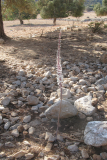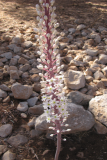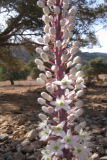Additional notes (click to expand)
Medicinal
Traditional Herbal Medicine Registration (THMR).
The dried bulb is cardiotonic, strongly diuretic, emetic and expectorant. Please beware; this is a poisonous plant.
Nomenclature
A synonym of Drimia maritima, ASPARAGACEAE
Plants of the World online, Kew Science http://plantsoftheworldonline.org/taxon/urn:lsid:ipni.org:names:534538-1
link
Toxicity
The bulb is poisonous in large doses. The acrid juice can cause skin blisters.
Geographical distribution
- Africa, Macaronesia, Canary Is.
- Africa, Northern Africa, Algeria
- Africa, Northern Africa, Egypt
- Africa, Northern Africa, Libya
- Africa, Northern Africa, Morocco
- Africa, Northern Africa, Tunisia
- Asia-Temperate, Western Asia, Cyprus
- Asia-Temperate, Western Asia, Israel
- Asia-Temperate, Western Asia, Jordan
- Asia-Temperate, Western Asia, Lebanon-Syria
- Asia-Temperate, Western Asia, Turkey
- Europe, Southeastern Europe, Albania
- Europe, Southeastern Europe, Greece
- Europe, Southeastern Europe, Italy
- Europe, Southeastern Europe, Yugoslavia
- Europe, Southwestern Europe, France
- Europe, Southwestern Europe, Portugal
Urginea maritima Baker
Family: HYACINTHACEAEGenus: Urginea
Species: maritima Baker
Common names: Sea Squill, Red Squill
Pharmacopoeia Londinensis name: Squills
Distribution summary: Europe
Habit: Bulbous
Hardiness: H2 - Tender; cool or frost-free greenhouse
Habitat: Frequently on sandy soils
Garden status: Not currently grown
Flowering months: September, October
Reason for growing: Medicinal, toxic, traditional herbal registration


